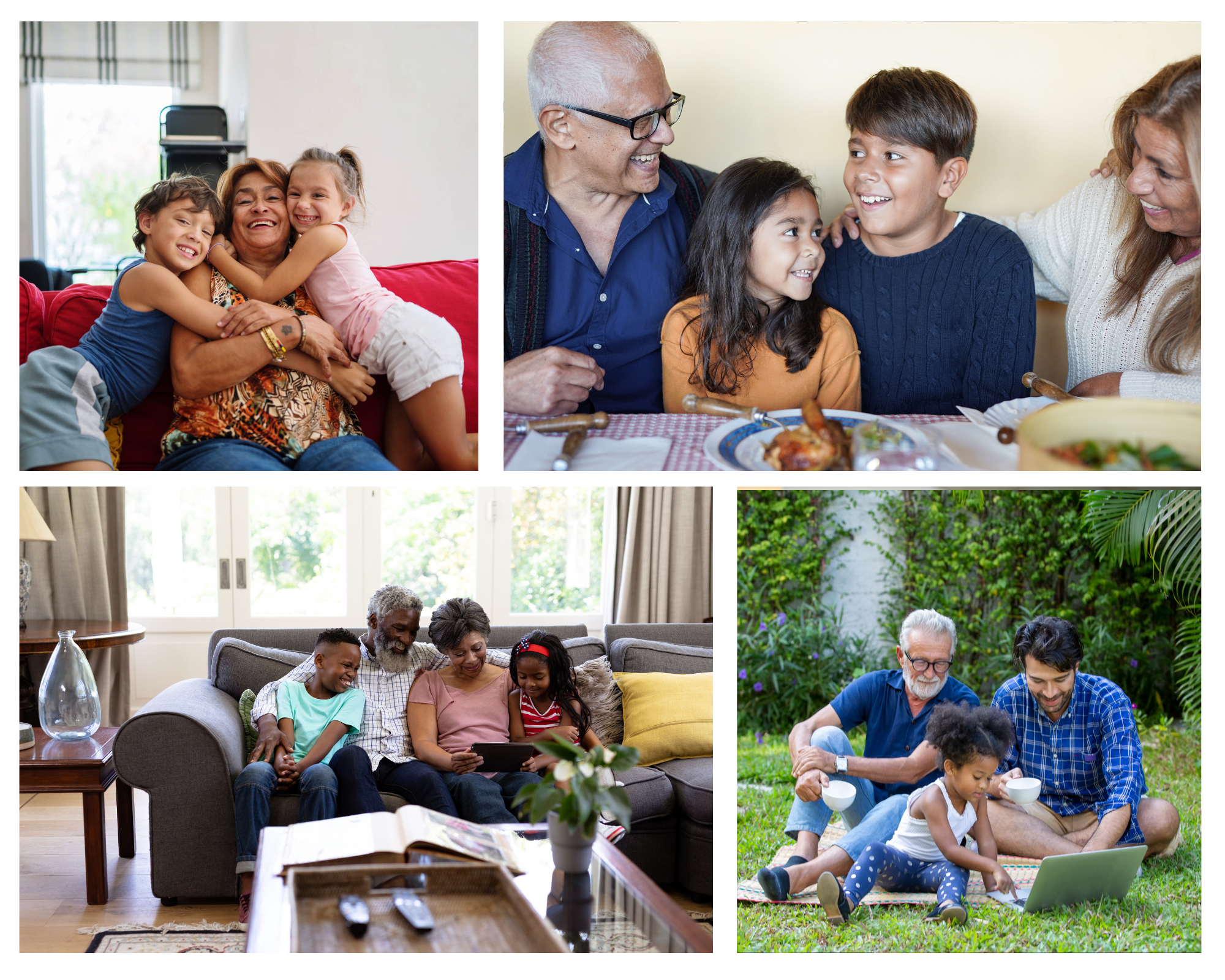
How Can Children Help Taking Care of Seniors at Home?
August 25, 2022How Can Children Help Taking Care of Seniors at Home?
The “sandwich generation” defines the group of people (usually in their thirties or forties) who are responsible for raising their children and caring for their aging parents simultaneously. Caring for children is tiring. Caring for older adults is daunting. Doing both at the same time is positively exhausting, especially as one’s parents continue to degenerate.
As this happens, some parents feel they must keep their family caregiver responsibilities separate. However, this does not have to be the case. If your children are a little older (around late elementary school), they can help care for their elderly grandparents—and both of them will benefit. So how can children help taking care of seniors at home?
Companionship
Did you know that loneliness occurs in 43% of seniors? These feelings of isolation lead to an increased risk of declining health. One of the best things you can do to avoid these feelings in your elderly parents is to encourage your child to talk with them. They can discuss anything—their days, their interests.
Your parents will likely be amused by your child’s enthusiasm and may be able to share some wisdom with them. As a positive for you, this could be the perfect time for you to take care of another chore, or maybe have a few minutes to yourself.
Light housekeeping
This chore might be better for slightly older children. You shouldn’t have to shoulder the housework all on your own. Assign your child certain, easy-to-manage chores, such as washing the dishes, dusting, vacuuming, or laundry. You can even incentivize them by creating a chart that marks their progress and rewards them with a treat at the end of the week.
On top of this being a great way to teach your children discipline, it will benefit your elderly parent. They won’t have to worry about bacteria that could make them sick or tripping hazards.
Brain games and activities
Mental exercise is beneficial to seniors and children alike. Seniors need to stimulate their brains to keep their memory, reasoning skills, and processing speeds where they should be. Children need mental exercise to continue expanding their minds.
Encourage your child to play board games and puzzles with your elderly parents. They’ll not only have fun together but they’ll improve their brain health while doing so. Again, this is the perfect time for you to take care of other tasks, or enjoy some personal care.
Help with technology
These days, children grow up alongside technology and may even have a better understanding of it than you do. If your older parent is confused by their smartphone, iPad, or television, it’s likely your children can help. Have them walk your parents through whatever puzzles them step by step.
Remind them that they’ll likely have to repeat themselves several times before your parent understands. While it’s easier said than done, urge your children to not get frustrated with your parent’s lack of understanding, as that may make your parents feel bad. It’s harder for seniors to grasp new technological concepts when they grew up in such a different environment.
What are some benefits for seniors?
In spending more time with their grandchildren, seniors can reap benefits that extend past having some caregiving needs accounted for. The connection between children and seniors creates a much deeper emotional impact than one might realize.
Older adults are energized by children
Spending time with children can inadvertently inspire seniors to be more active than they otherwise would have been. Children want to run around, bike, and play. In an effort to spend time with their grandchildren, your elderly parent may be more inclined to go on walks and play with them. They may forget some of their limitations in favor of fun.
In being more physically active, seniors feel mentally energized. They may be inspired to try new things they otherwise wouldn’t have.
Passing down knowledge
For many seniors, the tradition of telling stories about their upbringing and family history is important to pass down. Sharing this knowledge gives them a sense of purpose and pride while fostering a deeper connection. For many seniors, this is priceless.
Overall increased quality of life
Energized, engaged, and taken care of, seniors who connect with their grandchildren experience an increased quality of life. With more activities they look forward to, seniors feel less bogged down by activities that are less fun, such as doctor’s visits or taking medication. They are excited to see their loved ones blossom and grow, and want to be there for it.
What are some benefits for children?
Children also find great fulfillment in building a connection with their grandparents. Not only are they helping you with some caregiving activities, they are developing their social and emotional skills.
A stronger connection to family history
Each family has its own traditions and unique history that colors holidays and family reunions. In speaking with their grandparents, children can learn more about what it is that shapes their family members’ history. They can also learn more about history firsthand, as their grandparents lived through significant historical events that shaped the world.
Learning new skills
Just as seniors pass down family history to their grandchildren, they can pass down new skills. In spending more time with their grandparents, children can learn skills they otherwise may not have. For some, it could be a hobby, such as embroidery. For others, it’s carrying down certain cultural practices. These skills might grow to be utilized throughout their whole lives.
Reduced misconceptions about the elderly
Many children have preconceived notions about what aging is like, and how the older generation should behave. When children spend more time with seniors, they learn that older adults are still capable of so much.
Some children have the misconception that older adults are mean, scary, or grumpy. In spending more time with them, they learn that older adults are just as diverse as they are. This way, they also learn how to treat older adults with the respect they deserve.
Before allowing your children to help with care for aging parents…
Seniors should, of course, be treated with the same respect as everyone else. However, if you have younger children, you may want to stress a few key things about interacting with your older parents.
- Listen carefully: Some older adults may not speak as clearly as children want them to. Tell your child to pause and listen as their grandparents speak, and limit interruptions.
- Speak clearly: Many older adults have hearing impairments. Children should speak up and enunciate clearly, just don’t yell.
- Be gentle: Some younger children may play roughly, which may be too much for some older adults. Encourage your child to play gently, so as not to cause any accidental injuries.
- Be inquisitive: Tell your children to ask questions about their grandparent’s day and life experiences. This will help foster a connection between them.
An in-home caregiver can help
Even by giving your child some ways to help around the house, you are still actively providing care to your children and your older parents. This is a lot to ask from one person. If you find yourself overwhelmed by the variety of tasks on your plate, consider enlisting the help of a home care agency for some respite care.
At Home Care Powered by AUAF, we provide support to families across the Chicago area. Our caregivers can assist with any non-medical activities of daily living that your elderly loved one needs help with. We work with you and your loved one to create a plan of care that best fits your needs.
For more information on our home care services, call us at 773-274-9262.
Articles:
-
How to Use FaceTime: a Senior’s Guide
March 20th, 2024 -
The Best Organic Cleaning Products for Caregivers
March 19th, 2024 -
Celebrating St. Patrick’s Day with Seniors
March 14th, 2024 -
Intellectual Activities for Seniors to Keep their Brains Stimulated
March 13th, 2024 -
Tips for Communicating with Seniors with Hearing Loss
March 12th, 2024 -
How to Learn a New Language as an Older Adult
March 7th, 2024 -
Foods that Support Bone Health in Seniors
March 6th, 2024 -
A Note to Our Staff for Caregiver Appreciation Day
March 1st, 2024 -
The Importance of a Senior/Caregiver Bond
February 21st, 2024 -
Recreational Sports as Fitness for Seniors
February 27th, 2024 -
Exploring the Wonders of Reminiscence Therapy
February 15th, 2024 -
Staying Educated on Alzheimer’s Disease and Dementia Care
February 14th, 2024
Call Now! 773.274.9262







